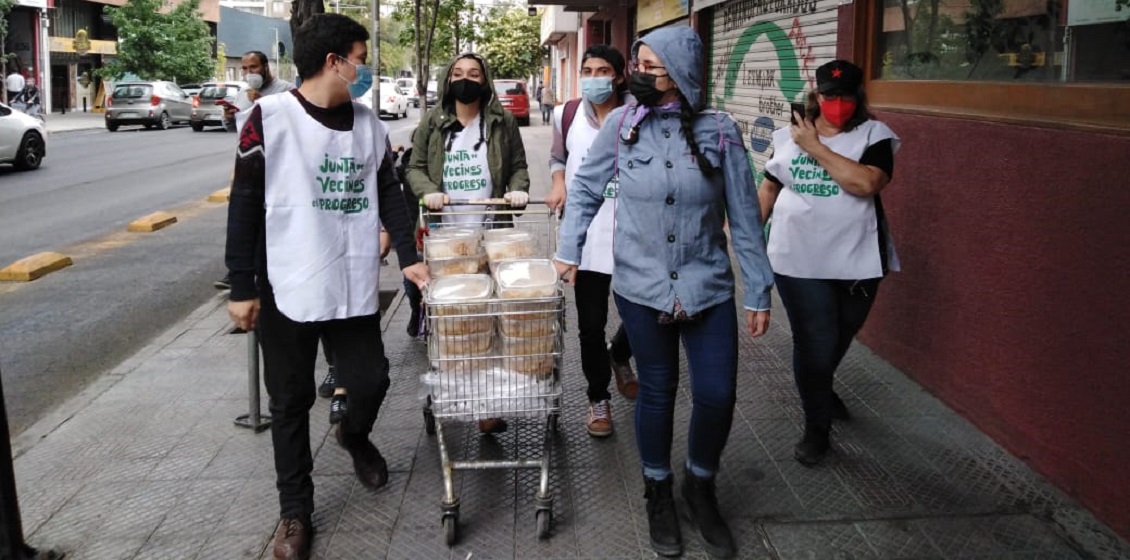 During 2020, due to the advance of COVID-19, people from popular neighborhoods in Chile have been organizing “Ollas Comunes” or “Soup Kitchen” as a way to provide meals to the community. Neighbors, friends, families from the same area who suffer from unemployment and sickness due to the pandemic, get organized and start again this historic food distribution system to ensure daily meals to thousands of families across the country.
During 2020, due to the advance of COVID-19, people from popular neighborhoods in Chile have been organizing “Ollas Comunes” or “Soup Kitchen” as a way to provide meals to the community. Neighbors, friends, families from the same area who suffer from unemployment and sickness due to the pandemic, get organized and start again this historic food distribution system to ensure daily meals to thousands of families across the country.
Chile is a country of disparity. When a person crosses the Andes mountains by plane, they can see the magnificent snow-capped mountains, impassible with their everlasting snow. They can also see the beautiful blue Pacific Ocean in the distance. Likewise, visitors can witness the relentless solitude of the driest desert in the world and also feel the freshest of air coming through the pristine forests from the south of the country. The magnificent beauty of Chile’s nature contrasts with the persistent economic and social inequality that caused the country to enter a political crisis that started in October 2019.
Then the coronavirus pandemic came and exacerbated the political and social crisis that Chile was going through, a health and economic crisis was added. In Chile, the pandemic deepened the wounds caused by economic inequality. Lockdowns, illness and unemployment brought by COVID-19 meant that a lot of people could not meet their basic needs.
The Soup Kitchen “Che Guevara” de Lo Prado
The clock marks 10:30 on Wednesday, March 17, 2021 in Santiago de Chile. In a small wooden house in an area called Población Ex-Campamento Che Guevara in Lo Prado, a fire is lit to heat the pot. The menu that the Soup Kitchen “Ex Campamento Che Guevara de Lo Prado” prepares for today is the traditional Chilean dish called “Carbonada”. The main ingredients for this meal are carrots, potatoes, rice, squash and meat.
The noise of the kitchen utensils harmonises with the laughter of the cooks. The Che Guevara Soup Kitchen team is formed by five people whose age ranges between 80 and 30 years old. Gladys, Adela, Patricia, Manuel and Pablo have dedicated time, effort and love to feed their neighbors since May 2020. The South American winter hit many Chilean families, who found themselves without work and unable to feed themselves.
In order to cook “Carbonada”, the team took approximately 5 hours and 25 kilos of potatoes, 1 whole squash plus three kg of onion. The first component of the dish began the day before when Gladys, Adela, Patricia, Manuel and Pablo decided the next day’s menu would be based on the vegetables and ingredients they had available. In this case it was decided to cook “Carbonada” and they began to peel and chop potatoes in order to cook and boil them the following day .
Manuel, is the young head cook of the “Olla Común” who grew up in Lo Prado and decided to apply his cooking skills and serve their neighbors. He is the one who runs the kitchen, while Pablo – his younger sibling- leads the organization and logistics of the kitchen soup. Pablo is in charge of receiving the contributions, e.g. money, food, masks, and gets in touch with other “Ollas Comunes”. Gladys, Adela and Patricia are neighbors of Lo Prado who decided to contribute with their time and labor to the Soup Kitchen.
The clock marks 1:00 pm and a woman with a bag arrives into the small wooden house where the cooks are. She asks for 2 servings. Then a boy comes and asks for 5 meals. Minutes later a middle-aged man arrives and asks for 16 servings. The rations are delivered by Adela, the records of the meals delivered are kept by Gladys in a small notebook. Patricia is in charge of serving the food. Neighbors come with masks. COVID-19 cases in Santiago and the country as a whole are increasing. However, there is always a warm greeting.
When the clock marks 3:00 p.m. the food delivery ends. Gladys counted 122 meals delivered today. “They are increasing every day as the confinement measures are becoming more rigid,” she states.
In order to solve the abandonment of the government: The people organized themself
There are no official records of the impact of “Olla Común” in Chilean society. There are only data records kept by the same social organizations. According to Paloma Ahumada, a sociologist who runs the @ComunOlla Twitter account, there are currently 490 “Olla Comunes” that deliver about 70,000 servings on a daily basis.
“Food is a human right. In Chile, particularly, this right has been threatened by unemployment and because the government has abandoned their citizens. What people have done is restore the historical tool of the “Ollas Comunes” to be able to satisfy their nutritional needs”, says María Emilia Tijoux, academic of the University of Chile and a woman who collaborates with the “Ollas Comunes”.
Tijoux defines the “Ollas Comunes” or “Soup Kitchen” as a way people practice grassroots politics. “Before the pandemic, during the October 2019 rebellion, “Ollas Comunes” were already being held. But it must be said that they have always been present in Chilean history like for example after an earthquake or any other natural disaster. A characteristic of the “Olla Común” is that it arises quickly, from one moment to another to show solidarity and address the food needs of the neighbors ”.
Social Media and Ollas Comunes
Like any other grassroot social and political organization, the “Olla Común” also has an online presence. They use social media networks like Twitter, Instagram and Facebook to spread their news and coordinate with each other.
Paloma Ahumada, who runs the @ComunOlla account on Twitter, argues that during 2020 and 2021, the internet became essential for the “Ollas Comunes”. They use social media mainly to seek donations, share resources and distribute food to other “Ollas Comunes” and for organization.
And she explains: “If a “Olla Común” has some vegetable, and another “Olla” need it, an exchange is made. During the last months and due to the political crisis that Chile is experiencing, social media is also a way to protect neighbors from police violence”, says Paloma.
It is important to mention that since 2019, Chile is experiencing a human rights crisis where state agents such as the police have been accused of systematically violating human rights of Chilean citizens. In recent weeks there have been complaints and videos of police violence towards “Comedor Popular Luisa Toledo”.
COVID-19, soup kitchen and people on the street
Valeria Bustos, president of the Junta de Vecinos El Progreso leads a team of 40 people that every Friday, organize a “Olla Común” and deliver meals to people who live in the streets. “We are a group who work on the basis of solidarity and we try to help mainly the migrant community, single mothers and the elderly” she details.
Currently, the Junta de Vecinos delivers food rations to almost 200 people. During the southern hemisphere winter of 2020, the lockdown caused many to fall deeper into economic hardship. Many ended up on the street because they had jobs who
“I remember that when the pandemic started, my first reaction as a person, a mother and a chronically ill patient was fear. The first action we took was close our headquarters and suspend all activities. However, the days passed and we realized that our neighbors were in need and that despite fear we had to go out into the street and help”, she says.
And even when the “Ruta Calle” team of the Junta de Vecinos has suffered the consequences of COVID-19 disease, they continue to work in solidarity.
“We have a colleague who had COVID-19 and she is experiencing long-term COVID symptoms. This month, six people in our team got infected. This situation showed us that the virus is very close to us because our area is one of the neighborhoods with the most active cases. Unfortunately this goes hand in hand with poverty. So our attitude as a team is: We know we are at risk but we have to keep helping”, she states.
According to Tijoux, during the pandemic – and because of the crisis – the grassroot work of the “Ollas Comunes” has been strengthened. “There is an interest in participating. Everyday people come together and show solidarity. Anonymous people from Chile and abroad have sent their contributions. There is an organization among all the “Ollas” and they care about each other”, she explains. And she adds: “It is a collective grassroot organization with great stubbornness and that unfolds during very difficult times”.
Still, all the people who participated in this story argue that “Ollas Comunes” should not exist. “There is a romanticization of what “Ollas Comunes” and solidarity are, but this kind of solidarity or help should not exist. A person should NEVER be hungry. Social organizations like ours are self-managed. Deep down, we are poor people helping other poor people. That reflects a lousy political and economic system. It shouldn’t be like that because we are a country with so much wealth”, concludes Bustos.
Marta Apablaza Riquelme is a freelance science journalist based in Santiago, Chile
SUPPORT DDRN SCIENCE JOURNALISM. DONATE DKK 20 OR MORE![]() (APPLICABLE IN DENMARK ONLY)
(APPLICABLE IN DENMARK ONLY)


